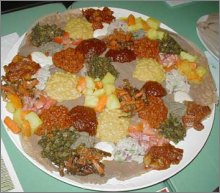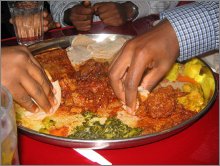|
|

|

Ethiopian Cuisine: Healthy, Delicious, Unique ... Here's Why You've Got to Try it in 2008!
by www.SixWise.com There's a reason why most major cities in the United States
have Ethiopian restaurants popping up all over -- the food
is not only good for you, it's delicious!
|

A huge platter of various Ethiopian wats, atop injera.
|
If you're looking for a culinary experience that's a bit
out of the ordinary, but that's sure to become a staple in
your life, Ethiopian cuisine it is.
Unlike Western meals, Ethiopian meals consist of several
types of vegetable and/or meat stews, called wat, which are
eaten atop a flat, sourdough bread called injera.
Injera is made from a gluten-free grain known as tef, and
is used in lieu of utensils (and sometimes a plate as well).
You simply tear off a piece of injera and scoop or roll up
a bit of stew with it (traditionally, this should be done
with your right hand only).
The characteristic flavors of Ethiopian cuisine are spicy,
sour, and rich. You'll find that many of their dishes include:
-
Pureed spiced vegetables, which include red onions, greens,
potatoes and more
-
Berbere, a red paste made with a variety of herbs and
spices
-
Butter flavored with onions, garlic, ginger and spices
-
Legumes such as lentils and chick
peas
-
Meats such as beef, lamb, goat, chicken or fish
|

Eating Ethiopian-style is an experience in itself;
it's all about sharing, tasting and digging right in
(with no utensils!).
|
A popular drink that is often served in Ethiopian restaurants
is Tej, a sweet honey wine that is deceptively high in alcohol
content. This is served along with the meal, while Ethiopian
coffee is an important after-dinner drink (coffee actually
originated in Ethiopia).
Be aware if you decide to try out an Ethiopian restaurant
in your area that meals are typically served in the traditional
style, that is, with no utensils and sometimes on communal
platters for sharing. This is all part of the experience,
and it's highly recommended that you give it a try.
Alternatively, you can try out these tasty Ethiopian recipes
at home tonight:
Ethiopian Chickpea Wat
Ingredients:
- 2 tablespoons extra virgin olive oil
- 1 large red onion, finely chopped
- 2 carrots, finely chopped
- 1 potato, peeled and chopped
- 1/2 teaspoon cayenne pepper
- 1/2 teaspoon paprika
- 1/2 teaspoon ginger
- 1/2 teaspoon salt
- 1/2 teaspoon black pepper
- 1/4 teaspoon cumin
- 1/4 teaspoon cardamom
- 1 tablespoon tomato paste
- 1 cup chickpeas, drained and rinsed
- 1 1/2 cups water
- 1 cup frozen peas, thawed
Method:
-
Heat the oil in a large pot over medium heat. Add the
onion, cover and cook until softened, about 5 minutes.
Add the carrots and potato, cover and cook 10 minutes
longer.
-
Remove and cover and stir in cayenne, paprika, ginger,
salt, pepper, cumin, cardamom and tomato paste. Add chickpeas
and water and bring to a boil.
-
Reduce heat to low and simmer, covered, until vegetables
are tender and the flavor is developed, about 30 minutes,
adding a bit more water if needed. About 10 minutes before
the stew is ready, stir in green peas and taste to adjust
seasonings.
Recipe Source: Recipe
Zaar
Ethiopian Chicken and Onion Stew
Ingredients:
- 3 skinless chicken breasts, split
- 1 lime, quartered
- 8 cups water
- 1 tablespoon ground allspice
- 2 teaspoons minced fresh ginger
- 1 teaspoon fresh ground black pepper
- 1 plump garlic clove, minced
- 1 tablespoon cayenne, plus
- 1 teaspoon cayenne
- 1 teaspoon ground cardamom
- 1/4 teaspoon ground cloves
- 2 lbs red onions, finely chopped (2 jumbo)
- 1 cup unsalted butter
- 1 or 1 1/2 cups chicken stock
- kosher salt
- 4-6 hard-boiled eggs, peeled and sliced
- cooked rice, for serving
- plain yogurt, for serving
Method:
-
Place split chicken breasts in a large bowl; add lime
and water. Let stand while you prepare sauce.
-
Combine allspice, ginger, pepper and garlic in a mortar
and mash to a paste with a pestle or grind in a food processor
fitted with the metal blade. Add cayenne, cardamom and
cloves and mix again set aside.
-
Heat a large, deep sauté pan or casserole over
medium heat. Without using any fat, add onions and stir
constantly until some moisture has been released. Cook,
stirring often, until onions are soft and somewhat golden,
30 to 40 minutes. If the skillet gets too dry, add 1 to
2 tablespoons butter. This process is slow, but eventually,
onions will take on a golden color.
-
Add remaining butter and spice paste and stir constantly
until butter melts. Keep stirring over medium heat to
release flavor of seasonings, 2 to 3 minutes. Stir in
1/2 cup chicken stock and cook for 3 minutes.
-
Remove chicken pieces from water, shake them dry, and
push them into onion mixture. Cover and cook over medium
low heat for 7 minutes. Remove cover, stir in another
1/2 cup chicken stock and cook, uncovered, until chicken
is tender, about 35 minutes. Add more stock if sauce gets
too dry. (It should be creamy-saucy, not thin and runny.).
-
Sprinkle sauce with salt and more pepper to taste. Carefully
stir in eggs, without breaking them up too much or tearing
chicken off bone. Carefully spoon chicken, sauce and some
egg onto heated plates.
Recipe Source: Recipe
Zaar
Recommended Reading
The
6 Healthiest Staple Foods in German Cuisine
Instead
of Fritos, Doritos, Cheetos, or Tostitos ... Consider Edamame
Sources
GoNomad.com
GlobalGourmet.com
To get more information about this and other highly important topics, sign up for your free subscription to our weekly SixWise.com "Be Safe, Live Long & Prosper" e-newsletter.
With every issue of the free SixWise.com newsletter, you’ll get access to the insights, products, services, and more that can truly improve your well-being, peace of mind, and therefore your life!
|
|
|
|